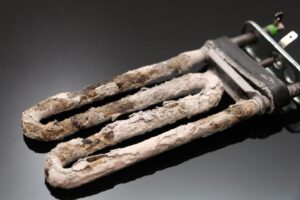Florida is known for having one of the highest hard water levels. Some people think that because hard water isn’t harmful to humans to drink, it’s not harmful to your plumbing. Hard water can wreak havoc on anything in your home that uses water, from your pipes to your appliances.
One of your home’s costly appliances is its water heater. Scaling in your water heater is a result of hard water. This is harmful to your water heater because the minerals eventually accumulate and interfere with its performance. Learn more about scaling and how to tell if it’s happening to your water heater in Riverview, FL.
Signs of Scaling in Water Heaters
Luckily, your water heater will give some noticeable signs when hard water deposits are causing problems. The first thing you’ll notice is noises coming from your water heater that are being caused by the accumulation of minerals and sediment. Because these minerals are heavier than water, they tend to settle and accumulate at the bottom of the tank. These noises include:
- Popping: This noise is caused by water that is trapped under the layer of sediment. As the water heats up, it “pops” or bubbles up through the layer of sediment.
- Kettling: This will sound just like the noise a teapot makes as it heats up. It occurs as the water under the layer of sediment becomes steam and whistles through the sediment.
- Rumbling: When the water under the sediment layer is trapped, the resulting sound is a rumbling noise. The water is essentially simmering beneath the sediment, unable to escape.
What Happens if Scaling Is Ignored?
The long-term effects of scaling can result in a costly repair and could end up becoming dangerous if you ignore it for too long. Scaling causes a pressure imbalance in the water heater tank that might shut off the system or lead to overflow. It can also wear down the bottom of the tank so that the lining no longer protects against corrosion and when this happens, your water heater is susceptible to major tank leaks.
How Is Scaling in a Water Heater Fixed?
Luckily, if the scaling isn’t bad, it’s a fairly easy problem to fix. The solution is to schedule water heater maintenance or a system flush. This will remove the sediment from the water heater so it’ll no longer damage your system. A water heater flush is something that should only be handled by professional plumbers. We can advise you on how often to perform this service since the sediment will eventually accumulate again.
What If I Have a Tankless Water Heater?
Unfortunately, despite the fact that they don’t have tanks where sediments can deposit, tankless water heaters aren’t immune to the effects of scaling. In fact, because there’s less space in a tankless water heater, scaling can be particularly detrimental. Scaling coats the coils and keeps the system from heating water properly. It can slowly eat away at the heating elements which results in major damage.
Contact the experts at Bayonet Plumbing, Heating & Air Conditioning to schedule water heater maintenance today.

